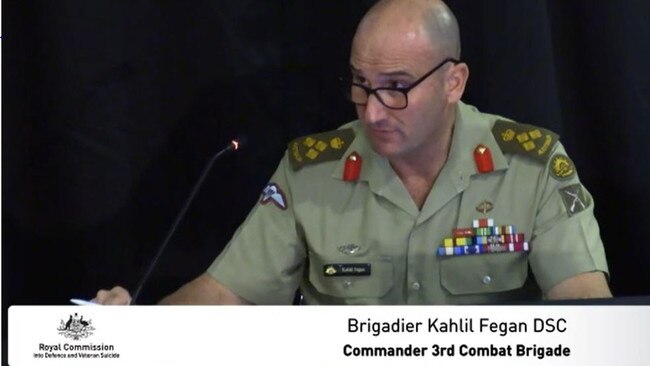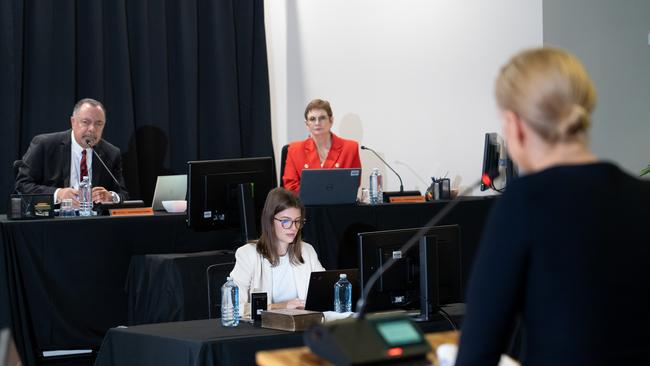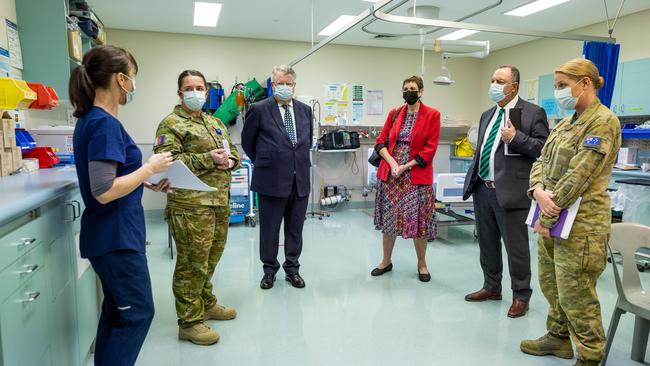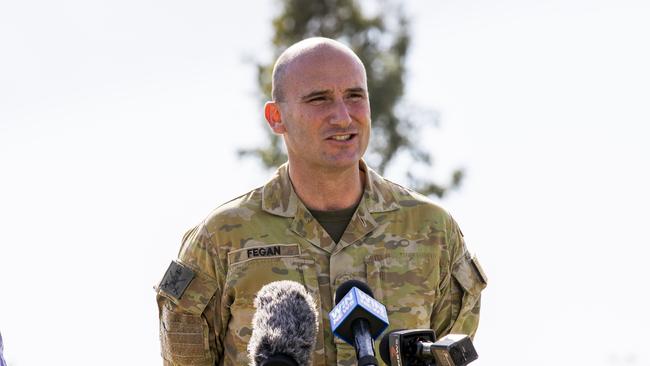Life at Lavarack under the spotlight as Royal Commission begins
Service members at a Queensland barracks face wait times of up to eight weeks to see the base’s single part-time psychologist, according to a senior military authority.
QLD News
Don't miss out on the headlines from QLD News. Followed categories will be added to My News.
A SINGLE psychiatrist working just two days per week currently services the thousands of military personnel based at Lavarack Barracks.
Commander of the 3rd Brigade, Brigadier Kahlil Fegan was questioned about the adequacy of this as he gave evidence about life for troops on the Royal Commission into Defence and Veteran Suicide began its first day of public hearings in Townsville.
Brigadier Fegan commands an estimated 3000 soldiers who are currently the first in line to rapidly deploy anywhere in the world and must maintain the highest training readiness of any Army brigade in the country to ensure troops are ready for anything.

Another estimated 2000 troops, who belong to other units, are also based at Lavarack.
Brigadier Fegan was asked if the up to eight week wait to see the part-time psychiatrist was adequate to service the estimated 5000 troops who work at the base.
He said the current set up was probably “as good as we are able to get” during business as usual at the base but said if the service could not scale up to meet high demand, like when troops return from deployment, it was not adequate.

In his evidence, Brigadier Fegan was asked what the Army was doing to ensure soldiers in deployable units felt comfortable to disclose mental or physical injuries, which might impact their potential to be selected for deployment.

He said a new generation of soldiers coming up in the ranks were more comfortable with raising concerns.
“Our men and women, who are predominantly young and professional … are highly motivated when there is a probability of being able to deploy and serve our nation,” he said.
“Are people incentivised to hide potential problems? There could be an element of truth to that.”
Brigadier Fegan said shortcomings in the health system, including long wait times to secure appointments, posed an additional challenge for personnel who raised a mental or physical injury. He estimated a wait time between four and eight weeks for a soldier who had a “niggling injury” in its early stages.
“In many ways this disincentives people from putting their hand up,” he said.
The commission was told that at any given time, about 15 per cent of soldiers within the brigade were medically downgraded for physical or mental injuries.
EARLIER:
DEPLOYMENT, transition and life for service members at Lavarack Barracks will go under the spotlight as the Royal Commission to Defence and Veteran Suicide begins in Townsville today.
The first witness called to give evidence will be Townsville’s most senior Army Leader, 3rd Brigade Commander Brigadier Kahlil Fegan who will be asked about the management of alcohol use, domestic violence, the use of mental health assessments and the military discipline process.

Townsville is home to an estimated 20,000 defence personnel and veterans with more than one third of Army’s deployable combat capability permanently based in the city.
For the first time since it began, the royal commission will explore the complex topic of deployment and its impact on those sent overseas as well as their loved ones left at home.
Two days of have been allotted for evidence from Chief of the Defence Force General Angus Campbell who will be asked about abuse and unacceptable behaviour in the ADF, cultural reform and accountability for those who do the wrong thing.
In his evidence, Angus Campbell will also answer questions about recruitment, retention and transition into civilian life.
Senior Research Fellow at the Centre for Traumatic Stress Studies at the University of Adelaide and study manager for the Impact of Combat Study Dr Ellie Lawrence-Wood will also give evidence about the impacts of deployment to the Middle East.
Council assisting the Royal Commission Erin Longbottom in her opening address said there would be a focus on the procedures that surround involuntary discharge.
Ms Longbottom said personnel forced to leave on medical grounds were at a higher risk of suicide with government data supporting this.
The Royal Commission will open with evidence from Brigadier Fegan.
More to come.
More Coverage
Originally published as Life at Lavarack under the spotlight as Royal Commission begins




